Of all the epoch-upsetting events to take place over the past 18 months, no one could have predicted the success of a series in which viewers scream "take it off!" to an anthropomorphised Blob singing Uptown Funk.
A contestant on the UK version of The Masked Singer, Blob was, like many before him, simply following the well-worn path of picking up a microphone and stepping into the spotlight on a TV talent show. For 70 years, in different guises, the singing contest has formed the mainstay of primetime television viewing, and has adapted to meet the world's needs. So while there has been recent talk of the decline of a more traditional format of talent show, with old franchises like The Voice steadily declining in the ratings in the US and the death knell finally ringing for The X Factor in the UK, producers have been coming up with takes on the genre that are both more high-concept and more chaotic. These include The Masked Singer, where celebrity contestants conceal their identity beneath ever-more elaborate and leftfield novelty costumes, and now, launching next week in the US on the Fox network, Alter Ego, in which contestants don't even appear physically, but are instead represented by an avatar. Certainly, the success of The Masked Singer has shown that there's still life in the genre yet. But how exactly has the TV singing competition evolved and where can it go from here?
More like this:
- The new wave of provocative Indian TV
- The hit TV show that couldn’t be made now
- Is this TV's most toxic stereotype?
The history of these televised contests can be, in part, traced back to holiday camps, according to Annette Hill, professor of media and communication at Lund University, Sweden: "The best talent shows are great entertainment, full of warmth and empathy," she says. "If you look back at Butlins in the UK in the 1930s and 1940s, it was mainly a working-class holiday camp that offered a whole entertainment experience and at the heart of it were the people known as the Red Coats, who had to provide a warmth of atmosphere."
Not only did these holiday resorts become a rite of passage for TV's biggest talents – Red Coats comedians, magicians and presenters were often scouted, then sent to perform live at places like the London Palladium, before securing a television contract – but the culture within them meant that the audience were already invested in this type of entertainment once they returned home.
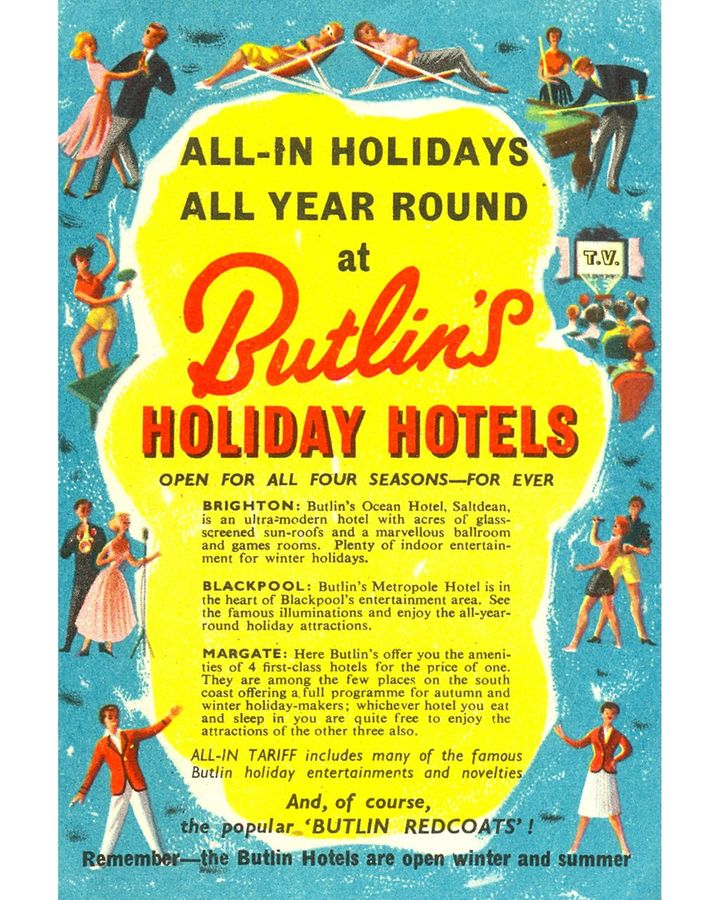
The roots of the TV talent show can be found in the contests held at holiday camps like Butlins in the UK (Credit: Alamy)
"Because of places like Butlins and these holiday camps, audiences were primed to watch in a particular way, with empathy and humour, and they were also primed to audition for [these shows] too," Hill adds. "There was a strong passing down of an entertainment history to audiences from this and the reality talent shows really just mined this cultural history."
In 1949, the simple premise of discovering ordinary people who have hidden, extraordinary talents came to prominence in the UK with Opportunity Knocks, which started out as a nationwide touring radio show, before moving onto TV in 1956. A series of undiscovered acts would perform on the show every week, with the audience responding with cheers that were counted on the clap-o-meter, before viewers at home were then invited to send in a postal vote for the winner, who was announced the following week.
In the US, talent show The Original Amateur Hour charted a similar trajectory, beginning life as a radio series, before being adapted for TV in 1947. It's estimated that up to one million people auditioned for the TV version until it was taken off air in 1970, and it regularly pulled in 10 million viewers. While undisputed talent occasionally burst onto its stage – like Frank Sinatra and the opera singer Maria Callas – it was not seen as a launchpad for big stars, but rather a light-hearted way to offer ordinary people 15 minutes of fame.
By the 1980s, there was still huge appeal for what became known as 'shiny-floor' talent shows, especially during weekend primetime. In the US, Star Search ran for 12 years in its original run, from 1983 to 1995, and as searches went, it did genuinely uncover some A-list talent, including Destiny's Child, Britney Spears, Justin Timberlake, Alanis Morrisette and LeAnn Rimes.
In the UK, fans were also still tuning in to these simple talent contest-as-entertainment shows – including New Faces and My Kind of People – but then come the 1990s, the nation became obsessed with impersonating already famous singers. Stars in Their Eyes ran for 16 years from 1990, and had the "wow" factor moment of transforming a pub singer into their idol, as the contestant said the famous words: "Tonight Matthew, I'm going to be…" and then stepped out from a puff of dry ice as their musical doppelganger.
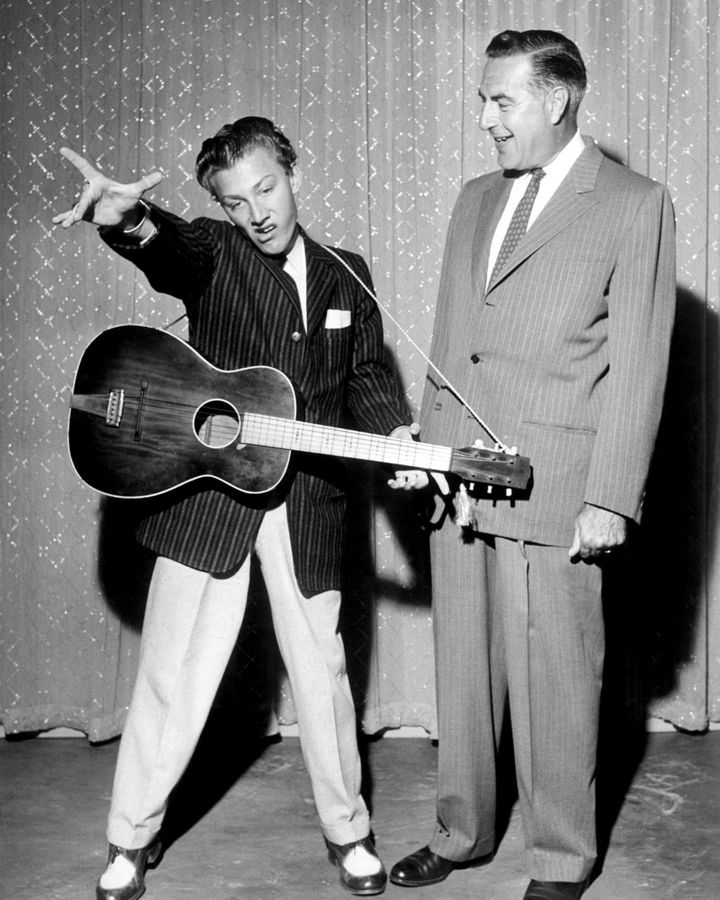
The Original Amateur Hour – which started on the radio but was then adapted for TV – was one of the US's first TV talent shows (Credit: Alamy)
There was an easy charm to Stars in Their Eyes – inspired by the Dutch series Soundmixshow – in that a member of the public was lifted from their day job, given a makeover to sing their song on stage to a huge television audience, and then... normal life resumed. There were no record contracts offered, and the show never set out to transform the lives of the contestants; it only wanted to transform one Saturday night for them.
But it was in the early 2000s that the high-stakes TV pop contest really arrived, along with promises that it would propel a few lucky auditionees to obscene levels of success and fame. Popstars – which began life in New Zealand in 1999 – Pop Idol, Making The Band and Fame Academy were just the precursors for the stable of talent shows created by the genre's mogul Simon Cowell including The X Factor, American Idol and the Got Talent franchise; the latter has had spin-offs in 69 countries around the world. The audience for American Idol peaked in series five in 2006 at 36.38 million, while, in the UK, The X Factor at its giddy heights delivered on its promise of creating new music icons, including One Direction, Little Mix and Leona Lewis. These particular shows became the face of the genre and also the default aspiration for a new generation of amateur musicians hoping to make it big.
What was special about these shows in the beginning was the way they intersected with the wider genesis of reality TV. "At the beginning with Popstars, it was just complete originality," says Rob Wade, the alternative entertainment president at Fox, and previously an executive producer for The X Factor. "It was almost like a documentary to begin with, rather than a shiny-floor show. It was the Simons [Cowell and Fuller] who took the idea of that and made Pop Idol and Idol was the first fully formatted singing competition show as we know it.
Shows like Popstars and Idol took us behind the scenes for the first time and gave us an insider's insight into the elusive world of showbiz, and how music stars are made. Wade explains: "You can look back at Star Search and all of those shows, but they didn't have a judging panel, they didn't show the magic of the audition process. To begin with, these audition processes were just the judges sat on a little desk with a little sign at the front that said Pop Idol and then people walked through the door and sang acapella."
This reality twist on the format made these shows must-watch TV. Once or twice in a series a genuinely incredible voice would burst out from the most unlikely person – Susan Boyle on 2009's Britain's Got Talent probably being the most famous example of this. But for every one Susan Boyle, there were hundreds who were gasp-inducing for all the wrong reasons. At the time, viewers happily revelled in schadenfreude as they watched terrible singers laughed out of the audition room, though not before vowing to the judges that this wouldn't be the last we'd see of them. It usually was.
The also met the new demands within the media landscape for a stream of newly-fashioned celebrities, while each season churning out a new, crowd-sourced popstar that the record label could guarantee would provide a chart-topping hit or two, as the audience were so invested, having spent the last 10 weeks racking up phone bills voting for them.
What's more, monetising the vote meant that there were vast sums of money to be made, and not just from the winning talent's career. In the seventh series of The X Factor in the UK, it's estimated the phone votes brought in more than £5.4 million in revenue. Hill says the shows began to morph from happy-go-lucky, fun series to production-line star-makers, which subconsciously changed the tone of the series: "Reality talent shows made it easier and quicker for audiences to pay to vote for the winner and loser, and to comment positively and negatively on contestants in social media."
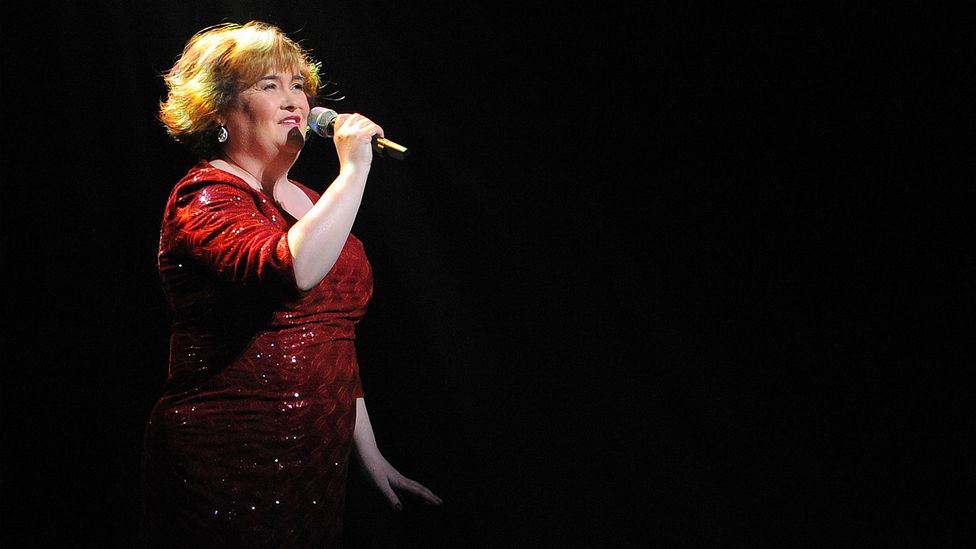
The success of Susan Boyle on Britain's Got Talent was a highpoint for TV talent shows, in making 'ordinary' people into superstars (Credit: ANDREW YATES/AFP via Getty Images)
The treatment of the "losers", in particular, became more uncomfortable as the series progressed. Re-watching some of the audition rounds of these shows now, you're struck by how callous the judges' comments often were, and how they presented a cruel spectacle in which the audience were set up to laugh at the "deluded" members of the public who believed they could sing. This was particularly acute in The X Factor, where, in some series, the "rejects" were brought together for an end-of-series performance that was clearly set up to be viewed on a par with a circus freakshow.
"At first [these contestants provided] a novelty factor," says Wade. "But as the shows grew and became more powerful, then it became more obvious that it was more [ethically] challenging to put people on TV who essentially weren't good at singing and [had] been put there to be laughed at. I think that's been the big change in society over the years."
When it came to the more successful contestants, meanwhile, edits of the shows also began to fall heavily on sad backstories – the "sob story", if you will – instilling the idea that singers had to mine trauma from their lives to up the emotional ante, making them seem to be more "worthy" winners. Even in the relatively new Cardi B-fronted Netflix show Rhythm + Flow, much is made of the of the often-harrowing life stories of the contestants, with winning the show presented as a panacea for people's struggles.
But audiences became more suspicious of such tropes. "The way that [people's trauma] is produced and narrativised made audiences call it 'emotional porn'," as Hill notes. "When a show is globally formatted, there's so much more pressure and commercial interests involved, and you start to lose positive ethics. There's more emphasis given to economic value rather than cultural value and when that balance tips over, that's when audiences get fatigued and why we've been seeing this fatigue for a while now."
However it hasn't just been the audience that has become tired of the relentless commercial nature of these series – previous finalists on the show have begun to speak out against issues they had to deal with when the cameras stopped filming.
Rebecca Ferguson, who was a finalist on the UK X Factor in 2010, is lobbying the British government for better duty of care for TV musicians, while in 2015, American Idol winner Phillip Phillips said he had been "manipulated" and sought to void all his recording and management deals with 19 Music, who managed the artists after their win.
But just as the dark side of the genre threatened to overshadow any previous genuine highs, in 2019, buzz spread in the US around a talent show that had to be seen to be believed. The Masked Singer was based on a South Korean format in which celebrities dress up in bizarre costumes and sing songs for a panel of other celebrity judges to guess their identity. There was no prize, other than the glory of winning; no record deal for the winner, no emotional manipulation or humiliation, just pure, unabashed fun and nonsense. It became an instantaneous hit, the US show followed by versions in more than 50 countries.
"The Masked Singer is such a great format," says Wade. "With the new added factors of costume and humour, it's much more of an entertainment spectacle. But it [also] has that pull – you're desperate to know who's behind the masks and the performances."
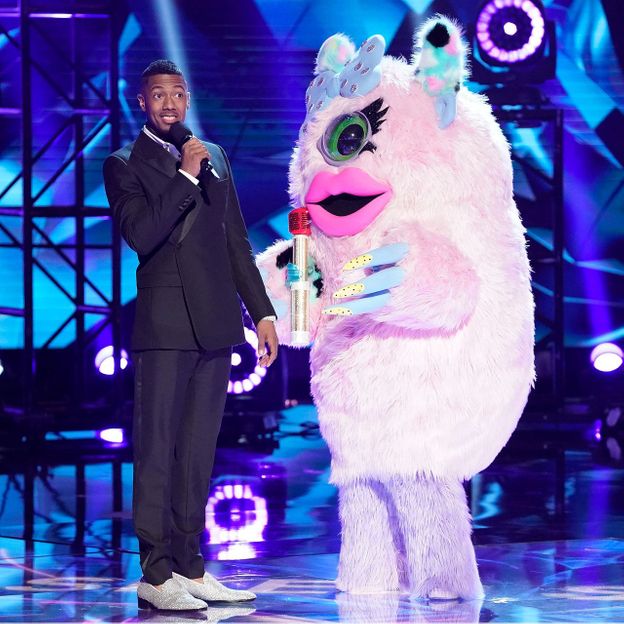
The Masked Singer – based on a South Korean format – has become a global smash hit (Credit: FOX via Getty Images)
The light-entertainment scene has been increasingly looking to East Asian countries for new concepts for shows, and South Korea in particular has been excelling in ideas that are bringing a much-welcome air of surrealism and eccentricity to the talent show format. Behind the scenes, TV bosses have been carefully researching the next iteration of the genre to keep audiences hooked.
Il-Joong Kim, head manager of Seoul Broadcasting System, says that Korean commissioners realised that the next step forward for TV talent shows was to add a game aspect to the standardised singing competition. Similar to The Masked Singer, I Can See Your Voice makes viewers and judges play a guessing game as to who are good and bad singers based only on sight, while Lotto Singer (or All Together Now, as the UK version is known) makes an almost bingo-like game with a judging panel of 100 people. "Korean music shows will evolve in such a way that various elements of interest are added to the music itself. They will not just show '[person after person] who sings well emotionally' in order," he says. "They would rather make viewers find the answer by adding new gaming elements such as hiding the contestants behind the masks or even gathering contestants in a group for the competition."
It appears Cowell has been taking notes from South Korea, as his next talent show Walk The Line, coming later this year, has also been game-ified: it will see singers perform, then have to make the split-second decision of whether to take a cash prize or risk advancing in the competition instead.
Wade is pinning Fox's next hopes for talent-show success on Alter Ego, which sees contestants perform as avatars to a panel of judges including Grimes, Alanis Morrisette and TV singing competition stalwart will.i.am. The show first came about as a way to produce a show while abiding by Covid restrictions, and uses state of the art technology also used in The Masked Singer. "Alter Ego is a stepping stone we had to jump on," says Wade. "You just know that in four or five years you’re going to see such a difference in the 'metaverse', [and us] living in a virtual alternative reality. Making it has been fascinating."
The show also manages to neatly side-step the issue of social media trolling, as contestants conceal their in-real-life identity. He adds: "Being famous is starting to be seen as more of a curse – I think a way in which you can hide your personality and just do the things you love without all the toxicity of fame is great."
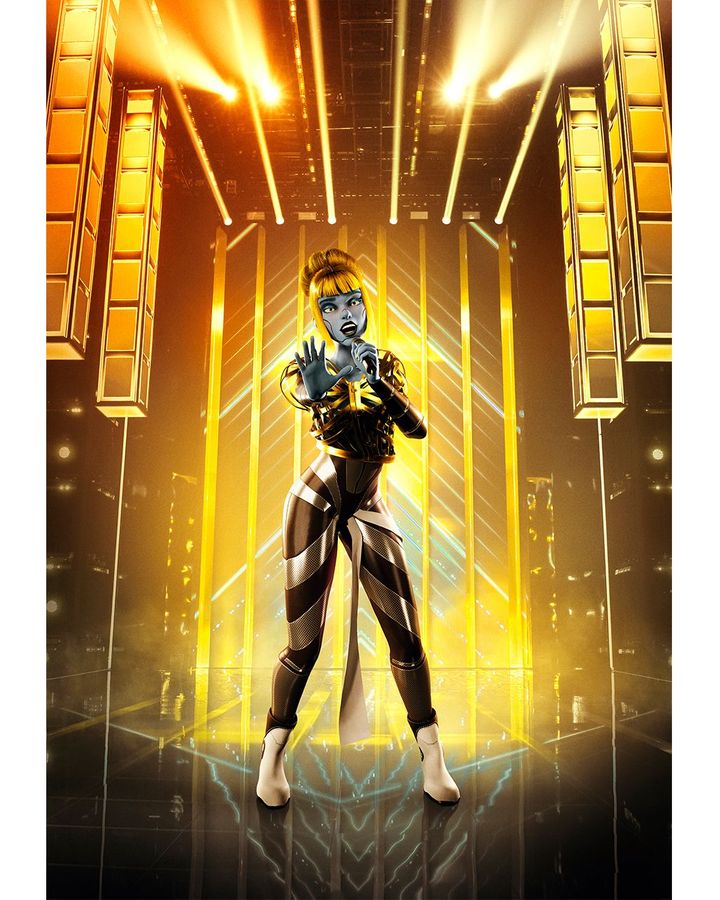
New TV talent show Alter Ego sees contestants perform as avatars, a modern twist on a classic formula (Credit: Fox)
Over in South Korea, meanwhile, programme creators are pushing new boundaries in a bid to explore as-yet untapped elements of talent shows. "At the moment, we're in the discussion stage for a music competition that I am crazy about that is called DNA Singer," says Kim. "I can't tell you more than the title at this moment, but everyone is excited about it. It's a new music show focusing on family and their genes as well as great music and a guessing game element."
People, younger people in particular, no longer discover new music on TV, but through many other mediums instead, Kim adds: "People don't watch TV only to enjoy music, as they would prefer streaming services and YouTube." With the music industry releasing their chokehold on these television talent shows, it too is looking to other sources like social media – Wade calls TikTok "one giant talent show" – to find new talent rather than primetime TV.
With this shift in both what shows are being made, and in what viewers desire, the genre hearteningly appears to be reverting to its roots of being an entertainment spectacular, giving the space for novelty and mad-cap amusement that's presented in a warm and humorous way. After a discordant patch, it's in tune again – even if some auditionees, as ever, are not.
Alter Ego premieres on Fox on 22 September
Love TV? Join BBC Culture’s TV fans on Facebook, a community for television fanatics all over the world.
If you would like to comment on this story or anything else you have seen on BBC Culture, head over to our Facebook page or message us on Twitter.
And if you liked this story, sign up for the weekly bbc.com features newsletter, called The Essential List. A handpicked selection of stories from BBC Future, Culture, Worklife and Travel, delivered to your inbox every Friday.
"TV" - Google News
September 15, 2021 at 06:07AM
https://ift.tt/399zNJe
How talent shows became TV's most bizarre programmes - BBC News
"TV" - Google News
https://ift.tt/2T73uUP
Bagikan Berita Ini














0 Response to "How talent shows became TV's most bizarre programmes - BBC News"
Post a Comment